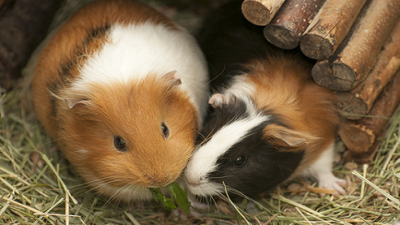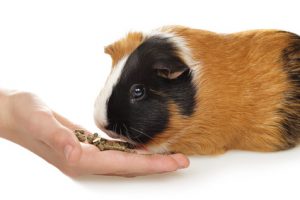Guinea Pig Care and Welfare Certificate Level 3

This course is also of interest to guinea pig owners wanting to learn more about the care and welfare of guinea pigs.
(Course cost is all inclusive of tutoring fees, assessments, materials and course registration)
*You will have access to the course for 6 months only. You can purchase course extensions.
Module 1
Guinea Pig Health & Welfare
Module 1 examines the routine health checks required for Guinea Pigs.
Learn about how to recognise and deal with parasites as well as common diseases and health disorders that affect Guinea Pigs.
Module 2
Guinea Pig Care & Nutrition
Learn about the nutritional requirements of Guinea Pigs and how to ensure an adequate diet that also incorporates aspects of environmental enrichment.
Cavies originate from the plains of South America. They live in family groups amongst long grass, which they tunnel through. Hiding in the long grass is important for their survival as they have many predators, including birds of prey, wolves, coyotes, snakes and wild cats. Grass is the primary component of their diet, although they will also eat other leafy plants. They are a member of the order Rodentia and the family Caviidae. This means that they are rodents and belong to the same family as a variety of other pets, including rats, mice hamsters and gerbils. However, they are more closely related to members of the family Caviidae.
Cavies are a group of South American rodents characterised by their large heads, chunky bodies and lack of a visible tail.As well as guinea pigs they include mara, capybara and several species of cavy, such as the yellow-toothed cavy. Their small size and short legs, together with their docile nature make guinea pigs easy to handle. However, it is important to remember that, as with other prey species, they are easily frightened and very prone to stress. It is therefore essential that they are approached calmly and quietly. Guinea Pigs are susceptible to a wide range of diseases and disorders. These include nutritional disorders, as well as diseases caused by a range of agents.As well as health care and nutrition, correct environment and sufficient exercise and enrichment also play major role in keeping guinea pigs happy and healthy.
As mentioned, wild cavies get their exercise from moving about amongst the grass in the plains. This tells us that wild cavies probably get quite a lot of exercise. It is therefore advisable that domestic guinea pigs have as much space to move around as possible. Having a large run on the grass is better than a large enclosure without access to grass, as choosing the best bits of grass encourages them to move around. Grass is the primary component of the diet of wild cavies. Although they are given access to grass and hay, domestic guinea pigs are also usually fed dry foods, sugary fruits and vegetables.
These are much richer in energy than grass, meaning that domestic guinea pigs can be quite prone to excessive weight gain. This is another reason why it is important to ensure that they get enough exercise. Having access to grass in a large run can certainly be considered as environmental enrichment for guinea pigs, as it allows them to express their natural grazing behaviour. However, it is still very important that other enrichment is provided to keep your guinea pigs mentally healthy and to prevent abnormal behaviours.
This guinea pig course explores how to provide environmental enrichment, adequate nutrition, carry out health checks and how to recognise common health problems and deal with parasites. The course is of relevance to anyone working with or owning guinea pigs.
We offer a selection of accredited and employer recognised courses specifically designed for careers working with animals.
If you have any questions about our courses, please contact us.
We’ve assisted many people to achieve their goal to work with animals. Read more about our 5-star reviews and student success stories.
Gain relevant training to achieve your goal to work with animals.


